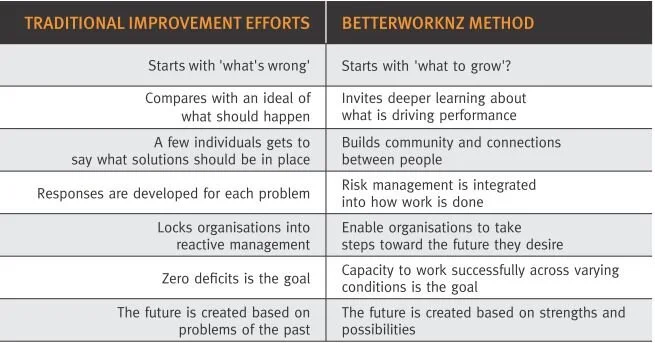2021 Litigation Forecast - Health & safety: Beyond Compliance
About the Authors:
Oliver Skilton
Partner at MinterEllisonRuddWatts
Oliver has a broad corporate and commercial practice with a focus on investigations, prosecutions and civil proceedings initiated by regulators. He advises clients in contractual, shareholder and fair trading disputes.
June Hardacre
Partner and Employment at MinterEllisonRuddWatts
June advises both the private and public sector on all aspects of New Zealand employment law. Her practice includes advising on health and safety, remuneration, incentives, data protection and employee privacy matters.
Even though the Health and Safety at Work Act has been in force since April 2016, WorkSafe has recently observed that “too many organisations remain locked in a ‘legal obligation’ mind set”.
WorkSafe is therefore challenging organisations to think beyond health and safety as a compliance exercise and start conversations around the concept of “better work” to create the safest workplaces possible. This will require directors and workers at all levels of an organisation to demonstrate real health and safety leadership and encourage worker engagement. When they do, we will start to see safer workplaces.
In encouraging “better work” in 2021, WorkSafe will be continuing to educate businesses on how to make workplaces safer as well as enforcing the Act. It will hopefully be able to do so without the backdrop of COVID-19 and lockdowns which dominated the health and safety landscape in 2020.
Emerging themes for 2021
Further officer investigations and prosecutions
At the end of 2019 and in 2020 we saw the first officers sentenced under the Act for failing to meet their due diligence duties, albeit in relation to closely held companies. This signalled the start of a trend by regulators, including Maritime New Zealand and the Civil Aviation Authority, to look more closely at officer compliance with their due diligence duties. In addition to the prosecutions of three directors of a person conducting a business or undertaking (PCBU) associated with the ownership of Whakaari/White Island, we understand that there are other prosecutions involving officers currently working their way through the Court system. Now that the period of educating officers of their due diligence duties under the Act is well and truly over, we expect the trend to investigate and prosecute officers to continue.
Broader Harm Prevention
Increased levels of remote working in 2020 led businesses and WorkSafe to place a greater emphasis on the mental health of workers and wellbeing risks. We anticipate that this will continue with many workers in the corporate sector, in particular working remotely at least some of the time.
Focus on Maori and Pacifika health and safety performance
WorkSafe is concerned about the higher rates of harm and exposure to risk experienced by Maori, Pacifika and migrant workers. As part of its Maruiti 2025 strategy, WorkSafe is working with these communities on harm prevention initiatives. In turn, we have seen many businesses implement strategies to monitor and improve Maori and Pacifika health and safety in their workplace. We see this positive trend continuing.
Greater emphasis on vehicle-related harm
We expect WorkSafe to focus on risks that continue to be a factor in serious harm incidents, such as vehicle maintenance and use. Across all industries, vehiclerelated incidents were the leading cause of fatalities in 2019/20.
Focus on the agriculture and utilities sectors
In 2019/20, ‘Agriculture’ and ‘Arts and Recreation Services’ had the highest number of fatalities (25 each from October 2019-September 2020), although the Recreation figure is skewed by the deaths arising from the Whakaari/White Island eruption. When converted to a rate of per 100,000 full-time equivalent workers, the ‘Electricity, Gas, Water and Waste’ sector represents the highest rate of fatalities in the last year. With such statistics, we expect WorkSafe to focus on PCBUs in these sectors in 2021.
Increased number of investigations
WorkSafe has faced recent criticism because of the decline in the average number of investigations it is conducting per month. We suspect that the decline is linked to resourcing issues, which were emerging themes for 2021 heightened in 2020 under Alert Level 4, during which WorkSafe’s inspectors were largely working from home. WorkSafe also diverted significant resources to focus on its investigation into the Whakaari eruption. With the investigation having now moved to the prosecution stage, and to counter criticisms regarding the number ofinvestigations WorkSafe carries out, we anticipate an uptick in the number of investigations, particularly in those sectors in which it is focusing.
| Average Number of Worksafe Investigations Per Month |
||||
|---|---|---|---|---|
| 2016 | 2017 | 2018 | 2019 | 2020 |
| 30 | 26 | 18 | 15 | 14 |
Continued decline in enforceable undertakings
2020 saw WorkSafe agree only five enforceable undertakings. In 2019, it agreed four. This contrasts with the 15 it agreed in 2018. We expect the reduced appetite of WorkSafe and PCBUs to enter into enforceable undertakings to continue. For PCBUs, despite detailed guidance from WorkSafe on the process and criteria, enforceable undertakings are time-consuming to prepare and negotiate. Once approved, they can also carry significant compliance costs. While the number and quality of applications for enforceable undertakings received by WorkSafe are not publicly available, we suspect that WorkSafe recognises the benefits associated with the publicity and deterrent effect attached to prosecuted PCBUs going through the Court system.
Strategic litigation
We didn’t see WorkSafe bring strategic litigation in 2020 to clarify uncertain areas of the law or to highlight the scope of its enforcement powers.
Specific issues that we anticipate WorkSafe will look closely at in the next 12 to 18 months, if the appropriate circumstances arise, include:
the scope and meaning of “so far as is reasonably practicable”, a term used throughout the Act; and
the duties of upstream PCBUs such as manufacturers of equipment.
Partner
Dispute Resolution & Litigation
Partner
Employment
MinterEllisonRuddWatts
09 353 9700













Even though the Health and Safety at Work Act has been in force since April 2016, WorkSafe has recently observed that “too many organisations remain locked in a ‘legal obligation’ mind set”.